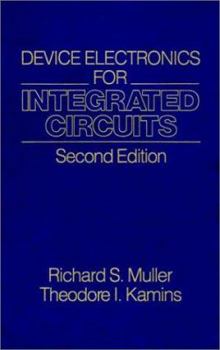Device Electronics for Integrated Circuits
Select Format
Select Condition 
Book Overview
Focusing specifically on silicon devices, the Third Edition of Device Electronics for Integrated Circuits takes students in integrated-circuits courses from fundamental physics to detailed device... This description may be from another edition of this product.
Format:Hardcover
Language:English
ISBN:0471887587
ISBN13:9780471887584
Release Date:January 1986
Publisher:Wiley
Length:544 Pages
Weight:1.75 lbs.
Dimensions:1.3" x 6.5" x 9.6"
Customer Reviews
3 ratings
Not an introductory textbook
Published by Thriftbooks.com User , 14 years ago
This is a well-written textbook, but I don't think it was intended as an introduction to the subject. Perhaps it is better to read through textbooks by Pierret or Streetman before opening this one.
Logical, organized, thorough, and clear
Published by Thriftbooks.com User , 21 years ago
This is for the 1986 2nd edition, Device Electronics for Integrated Circuits, ISBN: 0471887587. I have not looked at the recent 3ed. The fundamentals in this "1980's vintage" 2ed. text haven't changed, and therefore it is still relevant.In recommending this text, I assume you have already briefly encountered device physics in a class or in a bit of self-study, that you have an elementary grasp of solid state, semiconductor statistics, and electrostatics, and that you understand how to do elementary differentiation and integration. I also assume you like a logical, systematic approach.Successfully using this book reminds me of practice in (American) football: you must mix dedication, sweat, blood, and pain with ample time and passion to be prepared for victory on game day. In that vein, I spent about 90 hours of study (that I could spare) over a few months and studied EVERY page of this book, starting with the first page of the preface and page-by-page working my way to the last page in the last chapter, Ch. 10 (there are no appendices). (That's about 10 min per page, in case you're wondering.) I've looked at Sze, Tuar & Ning, Pierret, Neudeck, Wolf, and others. This book is superior for the prepared beginner. My undergraduate class used the Modular Series by Pierret and Neudeck, which in retrospect always leaves me with the same feeling watching someone trying to lose weight without working out and dieting; somewhere you have to struggle with the concepts and math. There is no other way.M & K's book is logically laid out and mathematically systematic, with each chapter building on the previous. That can be a disadvantage if you impatiently just want to plunge in on a MOSFET for example. But, if you start at the beginning and work your way painstakingly page-by-page to the end, you WILL understand device physics. This disciplined approach will pay off huge dividends. Do it. Buy it. Study it.I make no naive claim that a single text will get you to mastery. When finished with this book, I suggest next reading Sze's encyclopedic-like 1981 text as a good review of all types of devices, then going to a modern text like the one from Taur & Ning to get the latest updates. If you've done the preparation, reading Taur and Ning will be very insightful and enjoyable, as the pace is pretty quick. Finally, as a warmup before tackling M & K, you might consider "Intuitive Ic Electronics: A Sophisticated Primer for Engineers and Technicians" by Thomas M. Fredericksen.Good luck.
My favorite undergrad device physics text
Published by Thriftbooks.com User , 22 years ago
When I was in grad school I learned most of the basics from two books, Streetman and Muller and Kamins. I worked every problem in this book during that effort and I thought they were excellent. They had some challenge to them, introduced many good points not in the text, and were very relevant to real world practice. Despite the opinions of some other reviewers device physics hasnt really changed at the undergraduate level, hence this book is still a good choice. The book is restricted to silicon, which is still the dominant technology out there and really focuses on giving you a good basic background in devices used in today's IC chips. It is more focused in this sense than some other books, it does not deal with optoelectronic devices or MESFETs, but what it covers it covers very well, and does so in a very practical manner, reflecting the fact that Dr Muller is tightly tied into the Integrated circuit industry and his coauthor is in industry. Dr Muller has a reputation as an excellent instructor.





